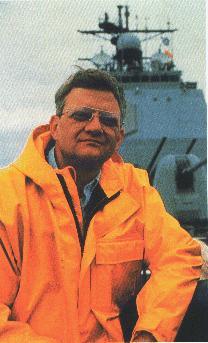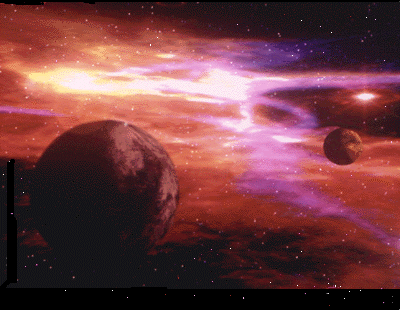

When people think of Richard Bach, the only book that comes to mind for most is Johnathan Livingston Seagull . This is a book that most people were introduced to in high school English. I first read Bach when my older brother sent my father a copy of Illusions about fifteen years ago. Since that time, I have read and re-read Illusions I don't know how many times.
Richard has a great ability to write on multiple levels. On the surface, most of
his books best books read like simple stories, but once you let go there is a deeper
 meaning. Richard shows us in illusions not to take life so seriously. This same
philosophy can be found in all of his later books. As Richard writes about his adventures
with and without his wife Leslie, we (as the reader) find a new way to look at life.
I know that this philosophy has had a profound effect on my life.
meaning. Richard shows us in illusions not to take life so seriously. This same
philosophy can be found in all of his later books. As Richard writes about his adventures
with and without his wife Leslie, we (as the reader) find a new way to look at life.
I know that this philosophy has had a profound effect on my life.
Richard also wrote a series of books back in the 60' s that dealt with his time as a military pilot. These stories, like the later ones, are mostly autobiographical. Richard writes about his life, and the adventures that he has had.
The most profound thing that I have ever read can be found in Illusions . "A Test to see if your mission in life is over, if you're alive, it isn't." Read Illusions and see all of the profound things that Richard writes in there. If you keep an open mind you will be surprised at what you will find there.
If you are interested in flying, Richard has written a number of books that you will love. These are book written by a man who loves to fly. The early books were put back into print about five years ago (about six months after I found the last one at a used book store). If you are interested in life philosophy, you will love all of Richard's more recent books. Johnathan Livingston Seagull to current.

Isaac Asimov has to be one of the world's best ever science fiction authors. There are two things that were invented by Isaac Asimov that any good Trekker will recognize. The first item is the positronic brain in a robot. The second are the three laws of robotics that he proposed. If you are a trekker, please take note of the fact that Data follows the three laws.
Asimov's fictional books can be divided into two general categories. The first are the robot books. He wrote a number of books and short stories dealing with robots. The other major class of books deals with his Foundation Trilogy . If you read through all of the foundation books, all of his major works, both Foundation and robot books come together in one major overall set of stories. Asimov was excellent at keeping all of his facts straight through all of the stories in his over his forty years of writing.
Asimov started writing in the 1930's. He published hundreds of short stories and a number of major novels. The best known would be The Foundation Trilogy . This would be the first Asimov book(s) I ever read. This series deals with mans distant future. This certainly isn't a Star Trek man overcoming his dark side science fiction. It is more of a man's struggle to thrive out among the stars and recreate a great stellar empire.
If you take the time to look through all of Isaac's accomplishments you will find something interesting. He was not just a fiction writer. He also wrote scientific works. Being a scientist, it is not surprising that Asimov wrote a more believable brand of science fiction.
We lost Isaac Asimov a couple of years ago, and I know that the world lost a great man. We will miss you Isaac.

Here is an American success story. A middle aged insurance salesman turned author. Who would have thought that when Tom Clancy decided to try his hand at writing where it would lead.
If the mark of a great author is detail, then Clancy is the master. The best aspect of a Clancy novel is the complexity of the plot. Not only does he write a novel weaving numerous plots and sub-plots, but unlike many of his contemporaries, Clancy never forgets leaves any hanging. Each sub-plot, no matter how small, is brought to a logical conclusion. All of the plots are weaved back into the whole before the completion of the novel.
All of Clancy's novels deal with at least some reoccurring characters. If you are an avid Clancy reader, then there is some familiarity with some of the characters in each novel. These characters continue to develop over time. This does not mean that you must read all of the books in order. Each book stands well on its own. As a reader, there is nothing I hate more than to pick up a new book only to find that it is part of a bigger work, and that I need to read other books in order for that one to make sense.
I have been somewhat disappointed in the Op-Center books. They are a product of a partnership with Steve Piecznik. Although these are good books, they are not of the same caliber of Clancy's solo efforts.

From 2001; A Space Oddesy through the Rama series and beyond, Clarke is a first class science fiction author. Clarke is another of those "Hard" Science Fiction authors. Clarke uses science to give his novels a believable quality.
I started reading Clarke in school when I first read 2001 . I have since enjoyed many other stories written by Clarke. When Clarke teams up with Gentry Lee, the combination is virtually unstoppable. Lee was the partner in the Rama series, and the two write exceptionally well together.
Unlike many of my other favorites, Clarke's works are not part of a bigger whole. Yes, the Space Odessey series and the Rama series go together, but that does not mean that all of his books have come together in one great plot like Asimov.
Clarke does have the belief that there is a higher intelligence out there that is studying and helping us along. It is a great thought that there is a species out there who is willing to protect us.

Dale Brown is another of the great military adventure authors. It is no surprise that he has a great ability to write about air combat and air operations. Dale Brown spent eight years in the Air Force as a navigator aboard both the B-52 and the FB-111 bombers. This gives Brown an insight into his subject that most authors spend countless hours of research to imitate.
Brown writes mostly about a special air operations center called dreamland where they design and build super-bombers. These include the B-52 Megafortress and a special Stealth bomber. Naturally Brown has numerous reoccurring characters.
Brown also wrote a book called Silver Tower that deals with a star wars type space station and a Russian ground based super laser. This is, IMHO Brown's best novel. I hope that he continues with the space theme.
There are also some sections dealing with a Marine special op team working with the Air Force super planes. Brown does not just limit himself to planes. He understands that a functional battle plan contains many different specialties to work. Ground, Air and land.
